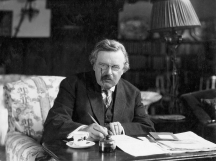A new study has come out predicting the death of religion.
This time it's because we're all getting richer. Not long ago it was because we're all living longer: young people who expect to live a long time put off worrying about what will happen to them after they die so they don't start thinking about God until they're older and closer to death.
Now, according to Dr Nicolas Baumard in Current Biology, it's money. In a study with several other academics, Baumard argues that several religions with an emphasis on self-discipline and morality arose during the 'Axial Age' (500-300 BCE) and that this was because this was because people got richer.
According to Baumard et al, affluence put rich people at an evolutionary disadvantage because they lived a "slow life" – they had fewer children, had less to eat since they were less aggressive about acquiring food and may have reproduced later in life. So, he thinks, the wealthy introduced moralising religions as a way offsetting these disadvantages by controlling the poor, who were more motivated by the "fast strategies" of acquisition, greed and procreation.
Writing in the New Scientist, Baumard said: "As more and more people become affluent and adopt a slow strategy, the need to morally condemn fast strategies decreases, and with it the benefit of holding religious beliefs that justify doing so.
"If this is true, and our environment continues to improve, then like the Greco-Roman religions before them, Christianity and other moralising religions could eventually vanish."
On the face of it, this doesn't sound terribly plausible. Of course there's a link between economics and religion, and there's certainly something that needs explaining about the religious movements of the Axial Age. Perhaps the scholars have got that right, though they're going against the flow in arguing it's a disadvantage to be rich.
But where they are certainly wrong – and arguably unscholarly – is in imagining that they've identified a future trajectory for religion based on their analysis of what happened in 500 BC.
On their particular point – that religion will die out as people get richer – there are plenty of modern examples to counter it. It might be true in Europe, but in other countries – China and South Korea, for example – the reverse is true.
Because the truth is that religion is not just one thing. Yes, for some people it's an an insurance policy against death, so if they expect to live a long time they don't bother going to church. And perhaps it's also a way of bringing order and spiritual harmony into society, controlling the violence and unpredictability that results from inequality. We can believe Christianity is true while at the same time acknowledging it fulfils social functions.
Religion adapts, changes and survives because it's rooted deep in human nature. Christians would say that this is because, in the words of St Augustine, "You have made us for yourself, and our hearts are restless until they find rest in you." Where faith fails to address real human need in a way that is convincing and relevant, it falters. Where it engages hearts and minds in a way that's logically compelling and emotionally satisfying, it prospers. That is the challenge for the Church in every generation, and so far, so good.
Lord Macaulay, the great English essayist and historian, took a similarly long view of the future of the Church. He was writing about the Roman Catholic Church, but Protestants might take heart from his words as well: "She saw the commencement of all the governments and of all the ecclesiastical establishments that now exist in the world; and we feel no assurance that she is not destined to see the end of them all. She was great and respected before the Saxon had set foot on Britain, before the Frank had passed the Rhine, when Grecian eloquence still flourished at Antioch, when idols were still worshipped in the temple of Mecca.
"And she may still exist in undiminished vigour when some traveller from New Zealand shall, in the midst of a vast solitude, take his stand on a broken arch of London Bridge to sketch the ruins of St Paul's."
Or, in typically pithy fashion, there's GK Chesterton, who wrote in The Everlasting Man about Christian heresies and atheist assaults: "At least five times, therefore, with the Arian and the Albigensian, with the Humanist sceptic, after Voltaire and after Darwin, the Faith has to all appearance gone to the dogs.
"In each of these five cases it was the dog that died."
Follow Mark Woods on Twitter: @RevMarkWoods

















